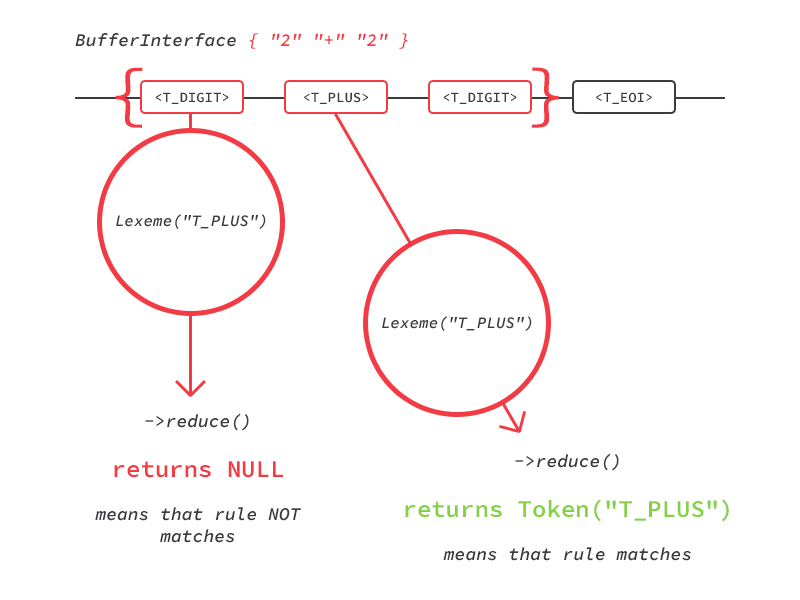Rules
In addition, there are other grammar rules. Note that each of the rules
contains a reduce() method.
Each terminal rule contains the following method signature:
-
reduce(BufferInterface $buffer): ?TokenInterface;
Each non-terminal rule contains the following method signature:
-
reduce(BufferInterface $buffer, \Closure $next): mixed;
Lexeme
Refers to the token defined in the lexer.
<?php
use Phplrt\Parser\Grammar\Lexeme;
$kept = new Lexeme('T_NUMBER');

The picture shows the scheme of work of this rule. Let's now create this buffer on which we will further check the rules:
<?php
use Phplrt\Buffer\ArrayBuffer;use Phplrt\Lexer\Token\Token;
$buffer = new ArrayBuffer([
new Token('T_DIGIT', '2', 0),
new Token('T_PLUS', '+', 2),
new Token('T_DIGIT', '2', 4),
]);
And let's try to reproduce its work:
<?php
$rule = new \Phplrt\Parser\Grammar\Lexeme('T_PLUS');
while ($buffer->valid()) {
var_dump($buffer->key(), $rule->reduce($buffer));
$buffer->next();
}
//
// Approximate Output:
//
// int(0) NULL
//
// int(1) object(Phplrt\Lexer\Token\Token)#7 (4) {
// ["offset":private] => int(2)
// ["value":private] => string(1) "+"
// ["name":private] => string(6) "T_PLUS"
// }
//
// int(2) NULL
//
This rule contains an additional Boolean option (second argument), which
indicates that this token will be visible as one of the $children of
the AST builder methods.
<?php
use Phplrt\Parser\Grammar\Lexeme;
$skipped = new Lexeme('T_WHITESPACE', false);
Concatenation
Sequence of rules.
<?php
use Phplrt\Parser\Grammar\Concatenation;
//
// EBNF:
// concat = some1 any2 rule3;
//
new Concatenation([<ID_1>, <ID_2>, <ID_3>]);
Alternation
Choosing between several rules.
<?php
use Phplrt\Parser\Grammar\Alternation;
//
// EBNF:
// choice = some1 | any2 ;
//
new Alternation([<ID_1>, <ID_1>]);
Repetition
Repeat one or more rules.
<?php
use Phplrt\Parser\Grammar\Repetition;
//
// EBNF:
// repeat_zero_or_more = some* ;
//
new Repetition(<ID_1>, 0, \INF); // repeat rule #1 from 0 to inf
//
// EBNF:
// repeat_one_or_more = some+ ;
//
new Repetition(<ID_2>, 1, \INF); // repeat rule #2 from 1 to inf
//
// EBNF:
// repeat_1_2_or_3_times = some{1,3} ;
//
new Repetition(<ID_3>, 1, 3); // repeat rule #3 from 1 to 3
Optional
Optional rule
<?php
use Phplrt\Parser\Grammar\Optional;
//
// EBNF:
// optional = some? ;
//
$optional = new Optional(<ID_1>);
// Same as "new Repetition(<ID_1>, 0, 1)", but faster